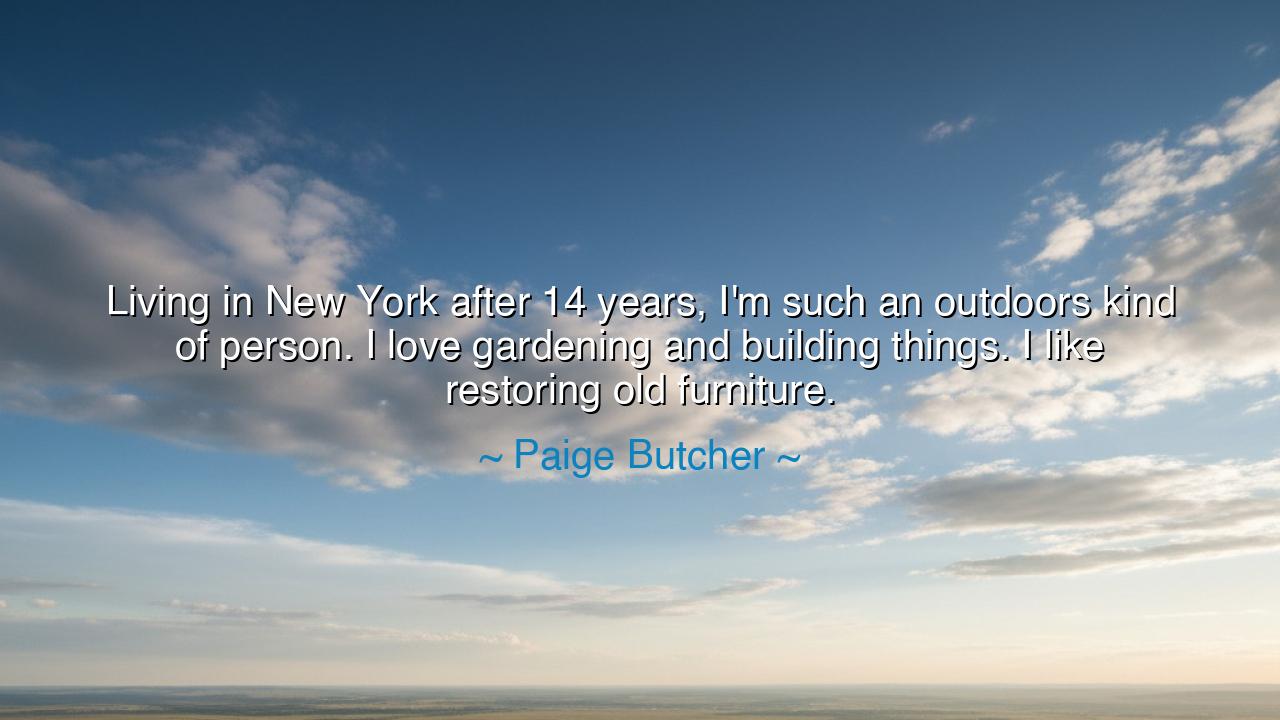
Living in New York after 14 years, I'm such an outdoors kind of
Living in New York after 14 years, I'm such an outdoors kind of person. I love gardening and building things. I like restoring old furniture.






In the heart of the bustling city, where the clamor of modern life is often deafening, there exists a quiet yearning—a yearning to return to the earth, to the simple act of gardening, to the patient and humble work of building and restoring. Paige Butcher speaks of this inner calling when she says, "Living in New York after 14 years, I’m such an outdoors kind of person. I love gardening and building things. I like restoring old furniture." These words are a beautiful testament to the ancient truth that, no matter how far we wander from nature, we are never truly separate from it. The soul longs for the earth, for the work of our hands, and for the creation of something that endures—whether it be in the soil or in the artifacts of the past.
In the time of the ancients, the act of gardening was not simply a means of sustenance, but a spiritual practice, a connection between man and nature that was as old as time itself. The great philosopher Aristotle taught that humans were most at peace when they lived in harmony with the natural world. To toil in the soil, to create life through planting, was to engage in a sacred act of creation. Just as the Romans believed their gardens were spaces of divine order and beauty, so too did they see the work of tending the land as an expression of their unity with the divine and the cosmos. Paige Butcher, in her reflection, taps into this ancient wisdom: that the act of gardening is not only a practical task but a return to the soul—a way to reconnect with the earth and its timeless rhythms.
Gardening, as Butcher describes, is about much more than just cultivating plants. It is about the act of creation, the joy found in shaping the world with our own hands. In the same vein, the work of building and restoring old furniture is an act of revival—breathing new life into something that may have been cast aside, honoring its past while giving it a future. The ancient Egyptians practiced a similar reverence for restoring the old. They believed in the concept of renewal, that the work of restoring an object, a temple, or even a piece of furniture was an act of respect for the past and a way to ensure that the future would be shaped by the wisdom and beauty of the past. For them, to restore was to acknowledge that all things are in a constant state of becoming, of transformation.
Restoration, in its deepest sense, is an act of healing. The ancient Greeks, with their emphasis on the importance of the body and the soul, understood the value of restoring balance. Whether it was through the practices of philosophy, art, or the tending of their gardens, they sought to bring order to the world and to themselves. Paige Butcher, in her love for restoring furniture, mirrors this ancient concept. She recognizes that in restoring something—be it a piece of furniture or a garden—there is a connection to the past, to history, to the very hands that have touched it before, and in this act, there is an eternal bond that transcends time. It is in the careful restoration of what was once lost that we find meaning, purpose, and continuity.
Let us turn our thoughts to the great builder and philosopher Vitruvius, whose work on architecture and restoration has stood the test of time. In his famous treatise on architecture, he argued that the key to great design was the ability to create something that endures, something that honors the past while preparing for the future. To restore, he believed, was to understand not only the structure of the material but the spirit of the object. The gardener, the builder, the restorer—all are artists in their own right, taking the raw materials of the world and shaping them into something meaningful. For Vitruvius, like Butcher, the work of restoration was not simply a task of labor, but of spiritual dedication—an act of paying homage to the earth, to the past, and to the future.
In our modern world, where the rush of time often makes us feel disconnected from our roots, the ancient wisdom of gardening, building, and restoring can offer us a profound reminder. It teaches us that there is beauty in slowness, that the process of creation and restoration is as important as the finished product. In gardening, we learn patience and respect for the cycles of nature. In building and restoring, we learn to honor the past while contributing to a future that reflects our deepest values. As Paige Butcher has discovered, when we engage in these acts with intent, we reconnect with something larger than ourselves—the timeless dance between creation and transformation.
So, let us follow Paige Butcher’s example and dedicate ourselves to the work of gardening, building, and restoring. Let us find joy in creating, in restoring, and in cultivating the land and objects around us, knowing that in these acts, we are participating in an ancient ritual of connection, transformation, and honoring what has come before us. In doing so, we bring not only beauty to the world but meaning, and in that meaning, we find our own place within the grand tapestry of existence.






AAdministratorAdministrator
Welcome, honored guests. Please leave a comment, we will respond soon